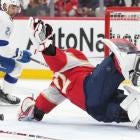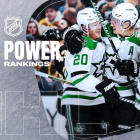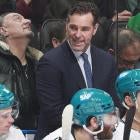The Washington Capitals are out.
Their title defense lasted just seven games, as the Capitals became the last team to be knocked out of the first round on Wednesday night in Washington. The Carolina Hurricanes took down the Caps in double-overtime of Game 7, ensuring that all four Wild Cards in this year's playoff bracket would see the second round while all four division winners got an early summer.
So how did the Hurricanes, in their first postseason appearance in a decade, take down last year's champs? Let's look at what went wrong for Washington.
Not enough secondary scoring
The Capitals' top line of Alex Ovechkin, Nicklas Backstrom and Tom Wilson was really excellent in this series. Those three guys accounted for 10 goals and 23 points through the seven games. The rest of the forwards? Just five goals and 17 points. And somehow it's worse than it actually sounds.
The only Caps player outside the top line who had more than a single goal in the series was Brett Connolly, who had two. Evgeny Kuznetsov, who led the playoffs in scoring with 12 goals and 32 points last season, didn't score his first (and only) goal of the series until the finale. The same goes for Andre Burakovsky.
Aside from those players, there were only three other goals from Capitals forwards: An empty-netter from Lars Eller in Game 1, a penalty shot from Nic Dowd in Game 5 and one from TJ Oshie, who missed half the series.
It's not like they were lighting it up from the blue line, either. The only Caps defenseman with a goal in the series was... Brooks freakin' Orpik, who netted the OT game-winner in Game 2.
Carolina's resilience
Of this year's playoff teams, the Hurricanes had the second-most inexperienced roster in terms of postseason games... and most of the playoff experience they did have can be credited to Justin Williams, who is a million years old. With a team that green, you might think they'd be toast after falling into a 2-0 series hole to the reigning Stanley Cup champs.
However, the Canes never panicked and they answered with two strong wins at home. Then they had their backs up against the wall 3-2. In a potential elimination Game 6, they came from behind twice before pulling ahead in the third period. Then, in a do-or-die Game 7, they got off to a slow start and trailed by a two at two separate junctures. But they managed to outlast the Caps and grind out the clincher in double-OT. In four games on the road, the Canes hadn't led for a single second until that Game 7 OT-winner.
Carolina proved to the league they're a team that should never be counted out of a game or a series. A big reason could be their admiration for coach Rod Brind'Amour ("I would run through hot coals for that guy," said Jordan Martinook after Game 6) but, either way, never giving up is a particularly impressive and admirable quality for a team that hasn't really been here before.
This is what leadership looks like. pic.twitter.com/D5TLkbxuOv
— Carolina Hurricanes (@NHLCanes) April 25, 2019
Aho's shorthanded goal
If you boil the series down to that do-or-die Game 7 in Washington, the single biggest moment may have come when Sebastian Aho scored a shorthanded goal about 10 minutes into the second period. The Hurricanes were trailing 2-0 at that point and going down 3-0 may have effectively killed them.
Aho cut the lead in half, if only for a short time (Kuznetsov doubled the lead again a few minutes later, but his answer was answered by a goal from Tuevo Teravainen).
That goal from Aho, which was a bit of a gift from goaltender Braden Holtby, seemed to breathe life into a Hurricanes team that was nearly suffocated for the duration of the first period.
Key injuries
It feels a little dirty to include this one because every team still alive has to deal with injuries -- including the Hurricanes, who were forced to play games without Micheal Ferland and Andrei Svechnikov (one of their strongest forwards in the front half of this series). Jordan Martinook was also clearly playing through an ailment.
But it'd also feel wrong not to acknowledge that the Capitals were missing a few of their biggest pieces from last year's Cup run. You knew they were going to miss top four defenseman Michal Kempny, who tore his hamstring late in the season. But they also suffered a major loss when T.J. Oshie suffered a broken collarbone in Game 4.
TJ Oshie is hurt pic.twitter.com/YIK2JjeICQ
— Pete Blackburn (@PeteBlackburn) April 19, 2019
Not only is Oshie a productive secondary piece in the Caps' group up front -- did we mention how badly they missed those in this series? -- but he's also unquestionably a heart and soul piece. He's a spark plug and a key locker room guy, and those types of players are especially important this time of year.
So while both teams had to endure losses to their lineup, it's obvious that Washington's key absences likely played into their early exit. It shouldn't be used an excuse but if you're taking a look at where things went wrong it's something you need to address.
Inconsistency
One of the Capitals' biggest issues all year long was their inability to play at top form for prolonged stretches. They showed flashes of the team that raised the Cup last year, but they also too often seemed to pull their foot off the gas and looked average.
After a great start to this series and two big wins at home, the Caps got absolutely punched in the mouth in Game 3. That thrashing gave Carolina hope and allowed them to get back in the series. At that point, you knew it was going to be a dogfight to the finish.
If you're going to be a serious contender and make a deep playoff run, you have to bring your best more often than not. The Capitals were just far too unpredictable and unreliable, especially behind the top line, and it killed them.
Game 7 was somewhat of fitting conclusion to Washington's season. It began strong and with so much promise, but they couldn't maintain a high level of play and just got worn down as things progressed.






















